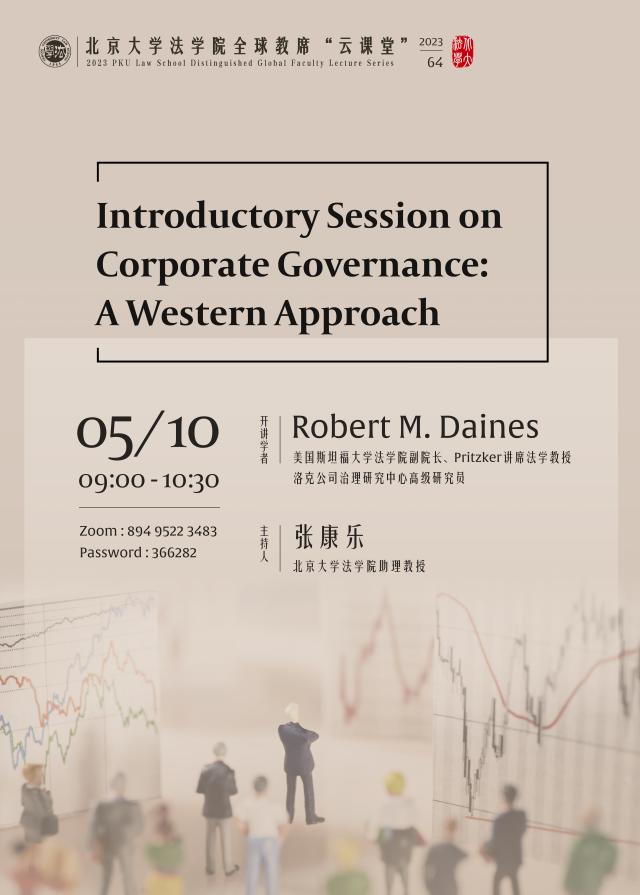全球教席“云课堂”—— Robert M. Daines:西方法学视角下的公司治理:导论
时间:2023-04-27 来源:对外事务办公室作者:

题目:Introductory Session on Corporate Governance: A Western Approach(西方法学视角下的公司治理:导论)
时间:2023年5月10日(周三)9:00-10:30
Zoom云会议ID:894 9522 3483
密码:366282
开讲学者:
Robert M. Daines(美国斯坦福大学太阳诚集团53138副经理、Pritzker讲席法学教授、洛克公司治理研究中心高级研究员)
主持人:
张康乐(太阳诚集团53138(中国)有限公司助理教授)
开讲学者:
Robert M. Daines是斯坦福大学太阳诚集团53138副经理、Pritzker讲席法学教授、洛克公司治理研究中心高级研究员。此外,他还是斯坦福大学商学院金融学教授。他的研究重点是法律与金融的交叉,包括CEO薪酬、公司治理、并购、强制性披露规定、IPO、股东投票和收购防御。Daines教授的作品主要发表在《金融经济学期刊》、《金融与定量分析期刊》、《法律、经济与组织期刊》和《耶鲁法律期刊》等顶级刊物上。他的研究也被《经济学人》、《纽约时报》、《华尔街日报》、《金融时报》、《福布斯》和《财富》等杂志和媒体所报道。在进入学术界之前,他曾是高盛的投资银行家,为银行和债券融资公司提供咨询服务。他也曾为美国第二巡回上诉法院的Ralph K. Winter法官担任法官助理。Daines教授于2012年被授予John Bingham Hurlbut卓越教学奖。
Robert M. Daines is the Pritzker Professor of Law and Business, Associate Dean, and Senior Faculty for the Rock Center on Corporate Governance at Stanford. He is also Professor of Finance (by courtesy) at the Stanford Graduate School of Business. His research focuses on the intersection between law and finance, including CEO pay, corporate governance, mergers and acquisitions, mandatory disclosure regulations, IPOs, shareholder voting and takeover defenses. Professor Daines’ work has appeared in such top publications as the Journal of Financial Economics, the Journal of Financial and Quantitative Analysis, the Journal of Law, Economics and Organization and The Yale Law Journal. His research has also been covered by The Economist, The New York Times, The Wall Street Journal, Financial Times, Forbes, Fortune and other media. Before entering academia, he was an investment banker at Goldman Sachs, where he advised firms on bank and bond financings. He clerked for Judge Ralph K. Winter of the U.S. Court of Appeals for the Second Circuit. Prof. Daines was awarded the 2012 John Bingham Hurlbut Award for Excellence in Teaching.
讲座摘要:
本讲座聚焦约束董事会成员行为的法律规则和公司治理规范。讲座首先介绍公司治理的总体目标、高管和董事的首要法律义务——比如董事必须勤勉、忠实,以公司的最大利益为行动出发点等。这些义务看似简单明了,但在具体实施过程中往往产生诸多问题。本次讲座将在具体情境中讨论这些问题。
We will focus on the legal rules and corporate governance norms that constrain and should shape the actions of a Board of Directors. We will start with the general aims of corporate governance and the primary legal duties of officers and directors. These legal duties are easy to state -- directors must act in the best interest of the firm, work hard and tell the truth. Though these rules are easy to state, they are often hard to apply. So we will spend most of our time working through examples of how these duties play out in specific settings.
课前阅读材料:
1. American Express
2. Hayes Oyster





